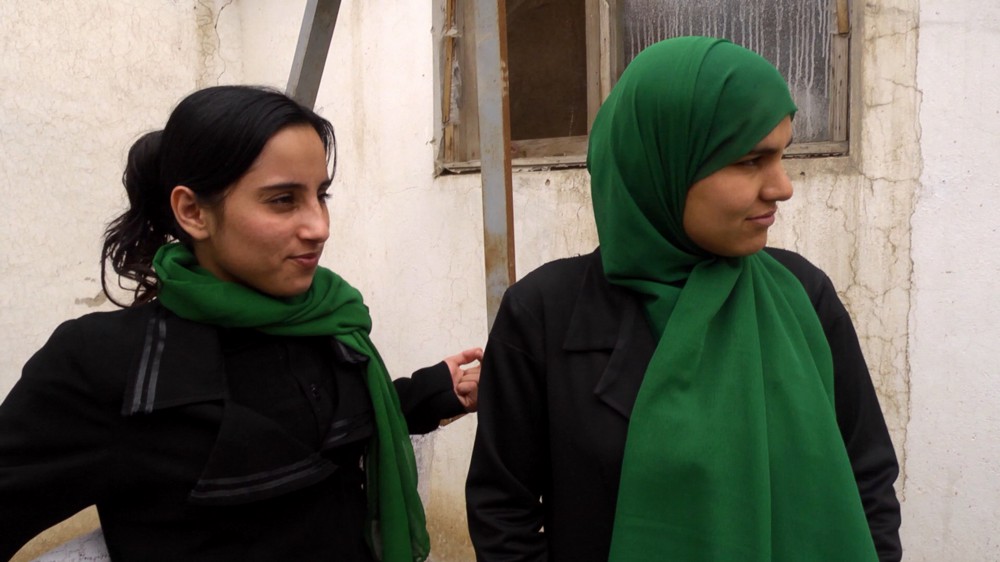Beth Murphy is founder of Boston-based Principle Pictures and Director of GroundTruth Films. Her work as producer, director, journalist, writer, and photographer is focused on human rights, equality, and justice. Murphy has directed and produced nearly 20 documentary films that have screened at film festivals and aired on broadcast networks globally. Her directing credits include the features “Beyond Belief” and “The List.” (Press materials)
“What Tomorrow Brings” will premiere at the 2016 Hot Docs Film Festival on May 3.
W&H: Describe the film for us in your own words.
BM: Girls who live in a small village in Afghanistan are given their first opportunity to go to school. Yes, they’re learning to read and write, but they’re also learning what it means to grow up in a rigidly patriarchal society, and how to navigate within it to survive.
From fathers and uncles who want to marry the girls off as teens, to the global geopolitics of rising terror networks, students at the Zabuli Education Center face high stakes. In their teachers and inside the walls of the school itself, they find sanctuary.
W&H: What drew you to this story?
BM: A whole combination of things that are part of my DNA because of the experiences I had growing up and what I experienced during previous filming in Afghanistan. My mother and father were both teachers, and education was valued above all else in our house.
Despite already having Master’s degrees, my parents were constantly furthering their own educations while I was a child, and encouraged my three sisters and me to do the same. I think this stemmed in part from my mother having been the first person in her family — male or female — to go to college. I do see a bit of my mom in these girls who are achieving more than anyone around them expected or thought possible.
That family history was important in terms of how I approached Afghanistan and connected to the plight of women and children during my first trip there in 2001/2002 and a second trip in 2006 for my film “Beyond Belief.”
The bottom line is that in order for girls to have a meaningful role in society, and in order for them to have a voice in the community and in their homes, they have to be educated. Witnessing how much these girls crave an education — and how much they thrive when they get it — made this filming very meaningful to me.
W&H: What do you want people to think about when they are leaving the theater?
BM: I want people to see that while the challenges are enormous, there is hope for Afghanistan. This school, these girls — they represent that hope. School founder Razia Jan is an agent of powerful, positive change in the country, and if we really care about the rights of women and girls in Afghanistan, it is important to support her and people like her.
W&H: What was the biggest challenge in making the film?
BM: Working in a place where journalists and westerners are targets of kidnapping and killing.
W&H: How did you get your film funded? Share some insights into how you got the film made.
BM: We had great support from ITVS, Gucci Tribeca Fund, Cinereach, Chicken & Egg Pictures, LEF Foundation, and The Fledgling Fund.
We also had a strong partnership with The GroundTruth Project through which I reported and wrote news pieces, and produced doc shorts, news packages (PBS NewsHour, NBC), podcasts, and the multi-media website “Foreverstan.” Our short films on the site were just recognized with an Edward R. Murrow Award, and the site is regularly updated with news about the school and about issues facing girls’ education in Afghanistan. This partnership has led to the creation of GroundTruth Films where I am excited to be working at the nexus of journalism and documentary filmmaking.
W&H: What’s the biggest misconception about you and your work?
BM: That I don’t need sleep. Very unfortunately, I sometimes do.
W&H: What’s the best and worst advice you’ve received?
BM: Best advice: “Any documentary over 85 minutes is akin to a hostage taking.”
Worst advice: “Sure, you can walk across the Afghan/Turkmenistan border.”
W&H: What advice do you have for other female directors?
BM: Enthusiastically embrace opportunity and change.
W&H: Name your favorite woman-directed film and why.
BM: I love Lucy Walker’s “Waste Land” — a beautiful, inspiring journey that left my heart and soul aching with wonder at the goodness of these human beings. For me, it achieved the best in documentary filmmaking.







